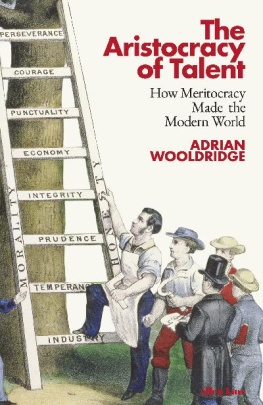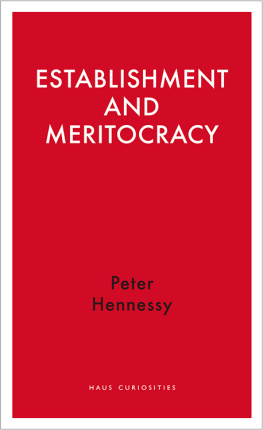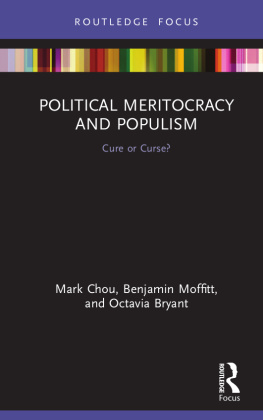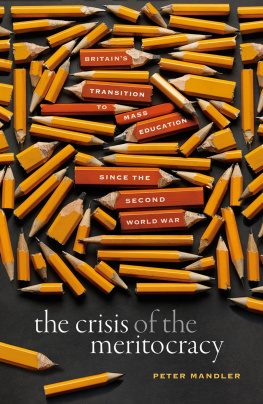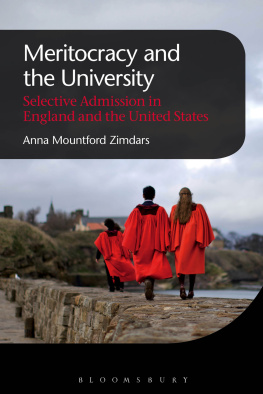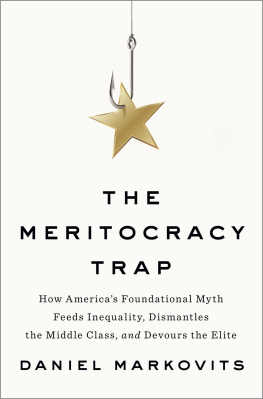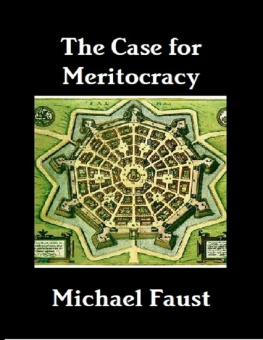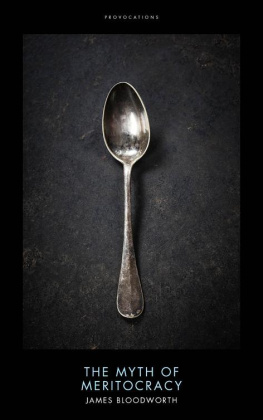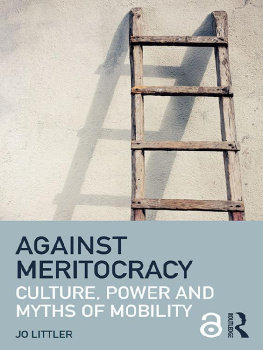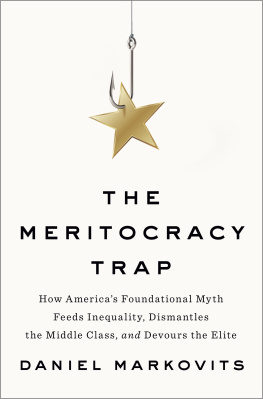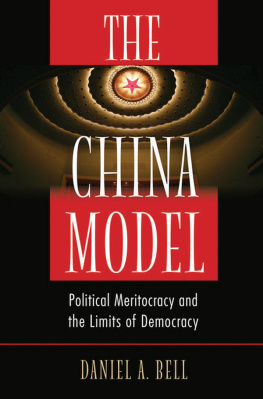Adrian Wooldridge
THE ARISTOCRACY OF TALENT
How Meritocracy Made the Modern World
Contents
PART ONE
Priority, Degree and Place
PART TWO
Meritocracy before Modernity
PART THREE
The Rise of the Meritocracy
PART FOUR
The March of the Meritocrats
PART FIVE
The Crisis of the Meritocracy
About the Author
Adrian Wooldridge is the Economist s political editor and author of its Bagehot column. He has also worked as the Economist s American bureau chief and author of the Lexington column, and management editor and author of the Schumpeter column. He earned a doctorate in history from Oxford University, where he was a Fellow of All Souls College. He is the author of ten previous books, including Capitalism in America co-written with Alan Greenspan and seven co-written with John Micklethwait: The Wake-Up Call, The Witch Doctors, A Future Perfect, The Company, The Right Nation, God is Back and The Fourth Revolution .
For
Simon Green
il miglior fabbro
Introduction
A Revolutionary Idea
It is now a commonplace that the ideas which have shaped and sustained Western societies for the past 250 years or more are faltering. Democracy is in retreat. Liberalism is struggling. Capitalism has lost its lustre. But there is one idea that still commands widespread enthusiasm: that an individuals position in society should depend on his or her combination of ability and effort. Meritocracy, a word invented as recently as 1958 by the British sociologist Michael Young, is the closest thing we have today to a universal ideology.
The definition of the word gives us a sense of why meritocracy is so popular. A meritocratic society combines four qualities which are each in themselves admirable. First, it prides itself on the extent to which people can get ahead in life on the basis of their natural talents. Second, it tries to secure equality of opportunity by providing education for all. Third, it forbids discrimination on the basis of race and sex and other irrelevant characteristics. Fourth, it awards jobs through open competition rather than patronage and nepotism. Social mobility and meritocracy are the strawberries and cream of modern political thinking, and politicians can always earn applause by denouncing unearned privilege. Meritocracys success in crossing boundaries ideological and cultural, geographical and political is striking.
The one thing that the most successful politicians in recent decades have in common is their faith in Michael Youngs neologism. Margaret Thatcher regarded herself as a revolutionary meritocrat, engaged in an epochal struggle with languid establishmentarians in her own party and thuggish collectivists on the left. Ronald Reagan pronounced that all Americans have the right to be judged on the sole basis of individual merit, and to go just as far as their dreams and hard work will take them. Bill Clinton declared that all Americans have not just a right but a solemn responsibility to rise as far as their God-given talents and determination can take them, a formula reiterated by Barack Obama.
Meritocracy straddles the EastWest divide. In his address to the National Congress of the Communist Party of China in 2017 President Xi urged the Party to select officials on the basis of merit regardless of social background. His acolytes never miss an opportunity to point out that Chinas relative success in fighting the Coronavirus pandemic compared with the West is proof of its superior ability to choose its leaders. Singapore pays top civil servants more than $1 million a year in salary and performance bonuses. South Koreans worship the American Ivy League even more fervently than Americans do themselves.
And the divide between the public and private sectors too: successful civil services the world over have introduced elite streams and merit-based promotion; successful firms, such as McKinsey and Goldman Sachs, sell themselves on the basis of their brain power; the tech industry regards itself as meritocracy incarnate. The citizens of nowhere that Theresa May once tried to demonize are, in fact, citizens of the global meritocracy.
Our culture reverberates with the sounds of meritocracy in action. The term smart (American for clever) has crept from people (the smartest guys in the room) to technology (smartphones) to policy (smart government, smart regulations, smart foreign policy). During his presidency Obama used the adjective in the context of policies more than 900 times. Companies boast names such as the Economist Intelligence Unit, IQ Capital Partners and Intelligence-Squared. Bill Gates advises schoolchildren to be nice to nerds on the grounds that one day they will be working for them. Sports stars and managers routinely boast that their sports are meritocracies in which all that matters is skill.
Politicians are alternately boastful and defensive about their IQs. As well as declaring himself a very stable genius, Donald Trump has repeatedly boasted that he has a very good brain and a high IQ. During his first run for the presidency back in 1987, Joe Biden ticked off a voter who asked him about his educational qualifications by retorting, I think I probably have a much higher IQ than you do Id be delighted to sit down and compare my IQ to yours. Boris Johnson has been known to rag David Cameron because he was a Kings Scholar at Eton, a sure sign of mental ability, while Cameron was an Oppidan, or regular fee payer.
This is not just froth. The meritocratic idea is shaping society from top to bottom. A growing proportion of great fortunes are in the hands of people with outstanding brain power: computer geeks such as Bill Gates (Microsoft) and Mark Zuckerberg (Facebook) or financial wizards such as George Soros (who pioneered hedge funds) and Jim Simons (who helped to found computer-driven quant investing). The worlds richest man, Jeff Bezos, graduated summa cum laude and Phi Beta Kappa from Princeton and makes a point of surrounding himself with academic super-achievers. High-IQ types are even thriving in the more rough-and-ready corners of capitalism: six of the seven biggest Russian oligarchs of the 1990s earned degrees in maths, physics or finance before becoming natural-resource tycoons.
Bill Clintons belief that there is a tight connection between earning and learning is proving truer by the day. In the United States, for example, a young college graduate earns 63 per cent more than a young high-school graduate if both work full time and college graduates are much more likely to have full-time jobs.
Education and IQ also determine where we live. In post-war America people with degrees were evenly distributed regardless of region or the urbanrural divide. Today only 10 per cent of inhabitants of Detroit have degrees compared with more than 50 per cent of inhabitants of San Francisco, Boston, New York and Washington, DC. Once-proud regional elites are being subsumed into a national elite defined by education and headquartered on the coasts. In Great Britain, talent is now concentrated in Greater London and an archipelago of high-IQ towns such as Oxford and Cambridge. A study of the whereabouts of almost half a million Britons who volunteered to have their DNA recorded in the UK Biobank suggests that people who leave deprived areas are brighter and healthier than those who stay behind.
Parents the world over labour on the same treadmill of meritocracy-driven hope and anxiety: British parents provide their teenage children with an average of ten hours extra tuition a week, Chinese parents with twelve, South Korean parents with fifteen and Bulgarian parents with sixteen.

